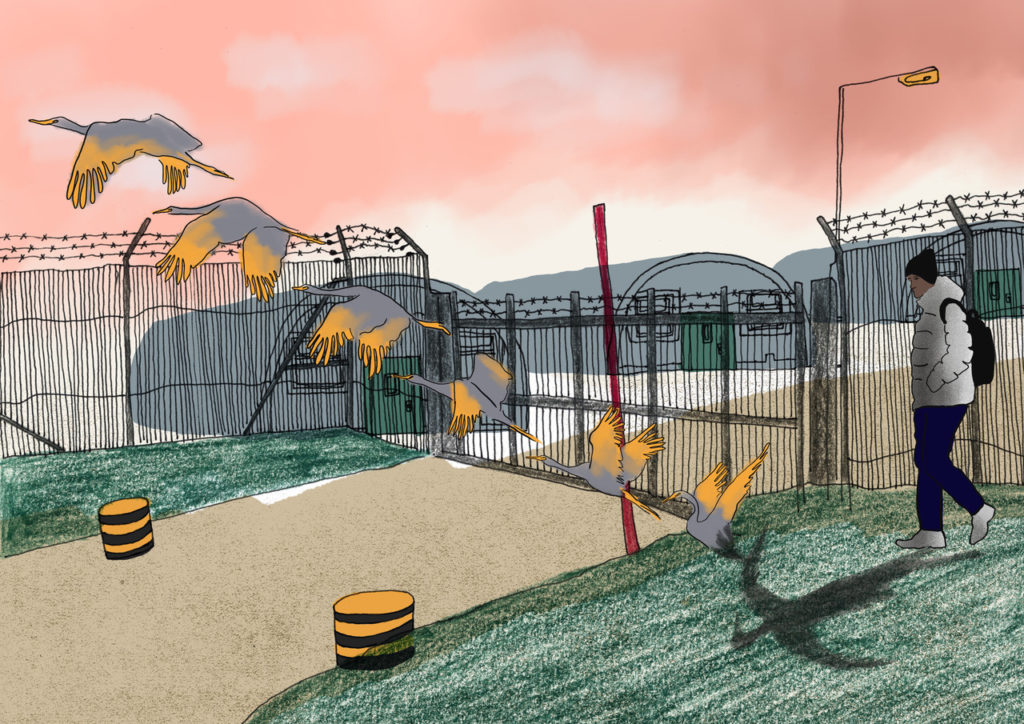Escape to Prison: The Story of a Gay Man Seeking Asylum in the UK

The illustration by Laurel Molly. Find her on Instagram @laurel_molly.
There are six strange men asleep in the small, cold room with him. Each on blue plastic mats on the floor. One mutters to himself. Another snores like an irregular chainsaw. A third has night terrors that wake everyone up. Even without the sounds, Mosi cannot sleep. Sometimes there’s so little fresh air in the cramped space that he feels like he can’t breathe. And if he does breathe, will it bring Covid into his lungs? Then there’s the fact that he can’t be sure that the men who work there won’t pull him out at any moment and torture him. It’s happened to him before. Although that was in his own country. And this is the UK.
After he escaped from the military camp where he was held and tortured, he thought life in the UK would be different. He’d heard that there, it was safe to be gay. That men like him didn’t have to be scared to live openly. He thought maybe the depression and fear that have stalked him ever since he was imprisoned would go away. But here he is. Back in another kind of prison. Terrified. Alone. With no idea how long he will have to stay.
To Mosi, cleanliness is very important. In the government-provided housing back in Bristol, he often cleaned up after his housemates because he couldn’t stand any mess. Here, there are too many people to clean up after and the mess is worse. Cigarette butts and hair balls in the shower drains, filthy toilets, puddles of water on the cement floors, mould in the bathroom. The other asylum seekers wash their clothes in the sinks or in rubbish bins because that’s the only way. The rest of the time there’s nothing to do; no games, no TV, no Wifi, no classes. So most people sit and stare out the windows at the depressingly run-down barracks or sometimes at a wall. At least a wall is blank and doesn’t remind Mosi that he’s back on a military base.
While Mosi stares at a wall, staff at Bristol Refugee Rights are working to get him released. They contact the Home Office and remind them about Mosi’s vulnerabilities, the fact that he had been receiving weekly mental health treatment and was waiting for appointments to diagnose a potentially life-threatening health condition. All information that the Home Office already had, but disregarded when they decided to move Mosi from the asylum seeker shared housing in Bristol and put him in Penally Camp. Still, the charity staff make phone calls and write letters. Gather evidence.
Penally Camp is renowned among human rights activists and refugee charities for its terrible living conditions. Helen Bamber Foundation and Doctors of the World have publicly called for improved conditions or closure, citing issues around access to clean and sufficient food and water as well as generally degrading conditions. And residents have themselves staged protests, asking for the camp to be closed. Part of these problems stem from the lack of planning on the part of the Home Office to make sure that the site was safe, that there were adequate services nearby and that locals were consulted.
Although many locals do support the people in the camp, there are others who, for a variety of reasons, do not think the camp should be there. Sometimes far-right groups gather at the gate, chanting and holding signs. They believe that Britain is being “invaded” by refugees and resent the fact that any assistance is being given to them. This can make going out the camp gates for a walk dangerous and terrifying.
There are no medical, educational or legal services on site. In such circumstances, especially without WIFI, it is difficult for the asylum seekers to interact with their solicitors, get to know them enough to share the traumatic stories they carry, and build their legal cases in order to receive the right to remain in the UK.
This is where human rights organisations step in, to fix the systemic failings. Bristol Refugee Rights finally prevails and Mosi is returned home, but he can’t stop thinking and talking about those not as lucky as him. “It is a terrible place,” he says. “They should stop sending people there.”
Tannith Perry
***This story is based on real life experiences of our member Mosi, who has been renamed for privacy purposes.
TAKE ACTION
Email your MP for the closure of inhumane army barracks.
Sign a petition to advocate for the closure of army barracks.
SUPPORT US